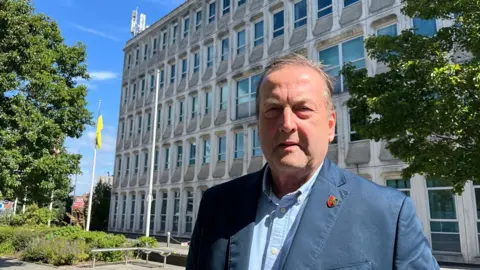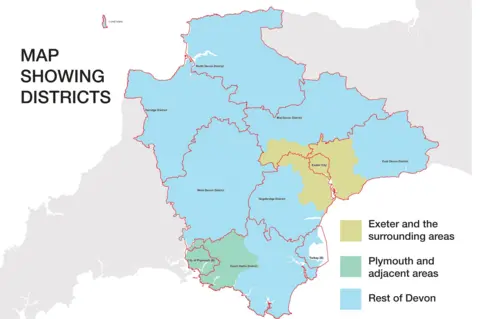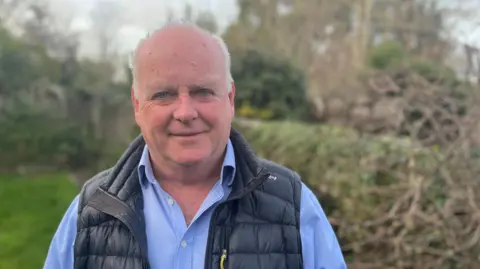Miles DavisDevon political reporter
 BBC
BBCPlans to reorganise local government in Devon have been heavily criticised by a rival council leader.
All of the district councils and the county council will be abolished and replaced by unitary authorities in the biggest shake-up of local government for 50 years.
Devon County Council unveiled its plans on Thursday to create the unitary authority New Devon – retaining the geographical area currently covered by the county council.
Exeter City Council leader Phil Bialyk, who wants to see an expansion of Exeter into a new unitary authority, dismissed the county council plans as “ineffective” and “too remote” and said any collaboration between councils in Devon had “broken down”.
 Exeter City Council
Exeter City CouncilUnder Devon County Council’s plans, New Devon would have a population of about 830,000 and keep the current unitary authorities in Plymouth and Torbay.
At the moment the biggest unitary council in England by population size is North Yorkshire with about 615,000 people.
Bialyk said New Devon would be “too distant and remote to be able to reflect the needs and priorities of many residents and communities” and would “just deliver more of what our residents already receive”.
He said the plan put forward by Devon County Council “would reduce accountability, create a democratic deficit and reduce the ability to respond to the diverse needs of local areas in an effective way”.
Bialyk said the local government reforms should be an “opportunity” to design new local authorities.
He has put forward a plan for a new unitary authority for an expanded Exeter which would take in towns like Exmouth and Dawlish to the south and Crediton to the north.
That would exist alongside an expanded Plymouth and a separate rural and coastal unitary authority with a population of about 675,000.
The government asked all local authorities in any given area to work together on coming up with proposals and share information.
However, Bialyk said: “Devon County Council has not engaged me at all – collaboration has broken down.”

Announcing the Devon County Council plans on Thursday, its Liberal Democrat leader Julian Brazil said it was the “least worst option”.
Deputy leader Paul Arnott, Liberal Democrat, said the council had been “handed a lemon” by the government and was attempting to “make democratic lemonade”.
Arnott said that keeping the same geographical area would “provide stronger local accountability” and “smarter use of public money”.
An expanded Exeter would have a population of about 255,000 people.
Plymouth City Council also wants to expand to take over parts of the South Hams and boost its population from about 265,000 to about 300,000.
Torbay Council is considering three options – to remain as it is, to expand into parts of South Hams and Teignbridge, or to cover all of South Hams, West Devon and Teignbridge.
Each area as a whole will have to submit one plan by the end of November, which might contain different proposals put forward by individual councils.



